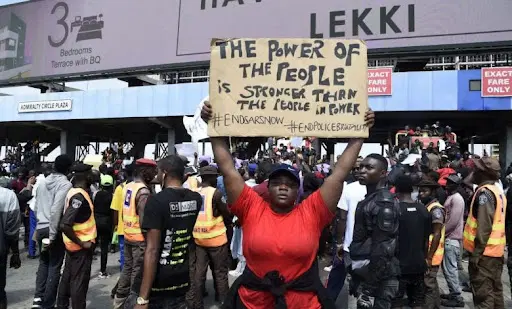Nigeria’s government has issued a last-minute appeal to avert protests over the escalating cost of living. This comes a day before civil society groups are set to hold nationwide #EndbadGovernance demonstrations against current policies.
Nigerian officials have cautioned against attempts to incite what most people term ‘Kenya-style’ violent protests, which recently led to the reversal of new taxes and the appointment of a new cabinet in Nairobi.
Africa’s most populous nation is grappling with soaring food inflation and a sharply devalued Naira after President Bola Ahmed Tinubu introduced reforms a year ago aimed at long-term economic recovery.
Speaking to journalists, Secretary to the Government of the Federation, George Akume, urged Nigerians to eschew protests, advocating for dialogue and highlighting measures introduced by Tinubu’s government to ease economic hardship.

The last major protest in Nigeria occurred in 2020 when young activists demonstrated against the brutality of the SARS anti-robbery squad. These demonstrations, the largest in Nigeria’s modern history, led to the unit’s disbandment but ended in bloodshed in Lagos. Rights groups accused the army of firing on peaceful protesters, a claim the military denied, asserting that only blanks were used to disperse a crowd defying curfew.
The upcoming protests in Nigeria coincide with Kenya’s President William Ruto withdrawing new taxes and reshuffling his cabinet after more than a month of anti-government protests, marking the worst crisis in his nearly two years in office.
Similarly, Ugandan officials arrested dozens of individuals earlier this month for participating in banned anti-corruption protests organised online by young activists inspired by Kenya’s demonstrations.
Nigeria’s movement, led by a coalition of small civil society groups, has gained traction through an online campaign using the hashtags #EndbadGovernanceinNigeria and #RevolutionNow. Government officials have oscillated between warnings of potential violence and conciliatory messages. Protest leaders accuse the government of setting the stage for repression with these warnings.
They are demanding that Tinubu reverse some of his reforms, including the suspension of a costly fuel subsidy, and address broader issues like ending hardship and hunger. Tinubu maintains that ending the fuel subsidy over a year ago was crucial for economic recovery. However, fuel prices have since tripled, exacerbating inflation, with food inflation now exceeding 40%.


